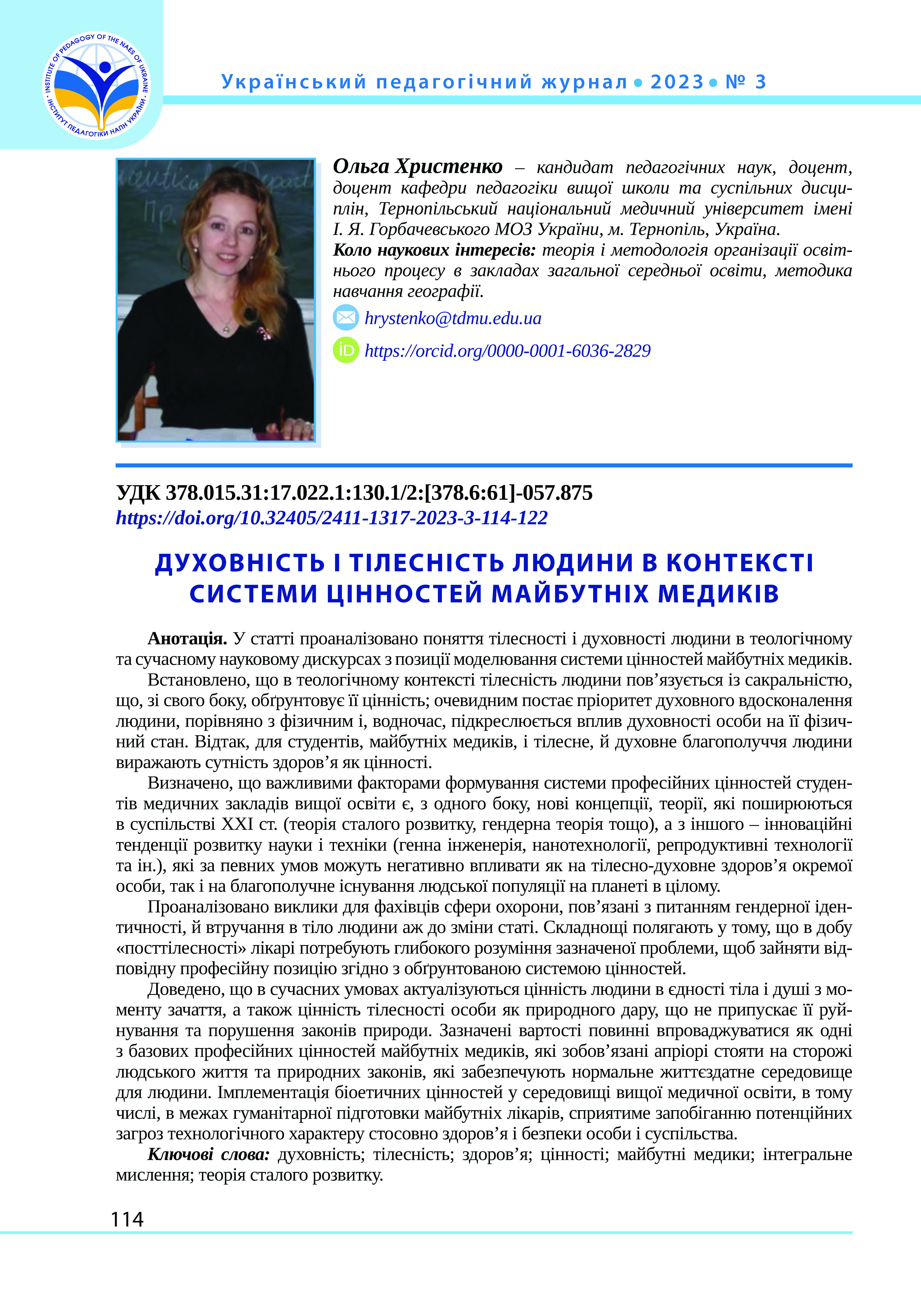Abstract
The article submitted for discussion by scientists and practitioners provides an interpretation of the decoupling phenomenon. A generalized definition of the phenomenon and specific features of its manifestations in the structural development of the modern Ukrainian school are provided. The methodological appropriateness of the inclusion of the concept of “decoupling” in the categorical apparatus of pedagogical science is discussed, and the range of organizational and methodical issues that are tangential to the manifestations of the decoupling effect during the implementation of educational activities is characterized. The effective signs accompanying manifestations of decoupling in the conditions of reforming the national education system were analyzed in terms of coordination, on the one hand of the qualitative level of services, and on the other hand, of the quantitative saving of resources involved in the functional and organizational structure of the educational sector.
Analyzing the phonemic decoupling considerations and judgments provided during the study, it is extremely important to determine that an unfounded and uncoordinated increase in expenses for the organization of educational activities will not always lead to an improvement in the quality of education. The discussed processes provide for different (quantitative or qualitative) organizational mechanisms, and therefore the increase in funding in the education system will not have a uniquely correlated effect on improving the quality of a few services provided to students by educational institutions.
At the same time, the practical implementation of the formula “increasing the quality level of education while reducing the costs of its established activities” can be ensured either by suspending the high rates of increased financing of dubious educational projects, or by designing and introducing innovative pedagogical technologies into the field of educational activity, which has every chance to accelerate the rate of growth of quality indicators in the context of the organization of the steady development of the national system of continuous education.
References
Білодід, І.К. (ред). (1973). Словник української мови: в 11 т. Т. 4: І-М. Київ: Наукова думка.
Білодід, І.К. (ред). (1978). Словник української мови: в 11 т. Т. 9: С. Київ: Наукова думка.
Вандишев, В.М. (2005). Філософія. Екскурс в історію вчень і понять: Навчальний посібник. Київ: Кондор.
Висоцька, О.Є. (2011). Освіта для сталого розвитку: науково-методичний посібник. Дніпропетровськ: Роял Принт.
Данилишин, Б.М. Веклич, О.О. (2008). Ефект декаплінгу як фактор взаємозв’язку між економічним зростанням і тиском на довкілля. 5. 12-18.
Доповідь «Our Common Future» Міжнародної комісії з навколишнього середовища та розвитку ООН. (1987). http://www.un.org/documents/ga/res/htm.
Дригола, К.В. (2021). Інтелектуальний капітал в умовах зеленої інтелектуальної економіки. Сучасні виклики розвитку економіки, бізнесу та публічного управління і адміністрування. Дніпро: ПДАБА. 70–72.
Ільченко, В.Р. (2011). Модернізація змісту загальної середньої освіти України на засадах освіти для сталого розвитку. Постметодика. 5. 16–17.
Коренева, І.М. (2018). Феномен «освіта для сталого розвитку»: сутність та сучасні особливості концепту. Український педагогічний журнал. 2. 113–123.
Кухар, В.П. (2001). До питання переходу України на принципи сталого розвитку. Проблеми сталого розвитку України. Київ: БМТ. 120-132.
Макарова, В.В. (2020). Ефект «декаплінгу» в контексті організації сталого сільськогосподарського землекористування. Ефективна економіка. 1. 1–10. http://economy.nayka.com.ua/pdf/1_2020/59.pdf.
Пометун, О.І. (2015). Педагогічні засади освіти для сталого розвитку в українській школі. Український педагогічний журнал. 1. 171–182.
Рамковий документ Асамблеї ООН «Порядок денний на XXI століття». (1992). http://documents-dds-ny-un-org/dos/UNDOC/GEN/N9283655.pdf.
Чайковська, Г.Б. (2021). Освіта для сталого розвитку в сучасній початковій школі: умови впровадження. Педагогічний альманах. 47. 50–57.
Шинкарук, В.І. (ред). (2002). Філософський енциклопедичний словник. Київ: Абрис.
Шубравська, О.В. (2005). Сталий економічний розвиток: поняття і напрям дослідження. Економіка України. 1. 36-42.
Bombiak, E. (2021). Assessment of the Level of Green Intellectual Capital Development – Polish Enterprises Case Study. European Research Studies Journal. 1. 1139 – 1156.
Bilodid, I.K. (1973). Slovnyk ukrayinsʹkoyi movy v 11 t. T. 4: I-M. Kyyiv: Naukova dumka. (in Ukrainian).
Bilodid, I.K. (1978). Slovnyk ukrayinsʹkoyi movy v 11 t. T. 9. Kyyiv: Naukova dumka. (in Ukrainian).
Vandyshev, V.M. (2005). Filosofiya. Ekskurs v istoriyu vchenʹ i ponyatʹ. Navchalʹnyy posibnyk. Kyyiv: Kondor. (in Ukrainian).
Vysotsʹka, O.Y. (2011). Osvita dlya staloho rozvytku : naukovo-metodychnyy posibnyk. Dnipropetrovsʹk: Royal Prynt. (in Ukrainian).
Danylyshyn, B.M., Veklych, O.O. (2008). Efekt dekaplinhu yak faktor vzayemozvʺyazku mizh ekonomichnym zrostannyam i tyskom na dovkillya, 5, 12‒18. (in Ukrainian).
Dopovidʹ «Our Common Future» Mizhnarodnoyi komisiyi z navkolyshnʹoho seredovyshcha ta rozvytku OON. (1987). http://www.un.org/documents/ga/res/htm. (in Ukrainian).
Dryhola, K.V. (2021). Intelektualʹnyy kapital v umovakh zelenoyi intelektualʹnoyi ekonomiky. Suchasni vyklyky rozvytku ekonomiky, biznesu ta publichnoho upravlinnya i administruvannya. Dnipro: PDABA, 70–72. (in Ukrainian).
Ilʹchenko, V.R. (2011). Modernizatsiya zmistu zahalʹnoyi serednʹoyi osvity Ukrayiny na zasadakh osvity dlya staloho rozvytku/ Postmetodyka, 5, 16–17. (in Ukrainian).
Koreneva, I.M. (2018). Fenomen «osvita dlya staloho rozvytku»: sutnistʹ ta suchasni osoblyvosti kontseptu. Ukrayinsʹkyy pedahohichnyy zhurnal, 2, 113–123. (in Ukrainian).
Kukhar, V.P. (2001). Do pytannya perekhodu Ukrayiny na pryntsypy staloho rozvytku. Problemy staloho rozvytku Ukrayiny. Kyyiv: BMT. PP, 120‒132. (in Ukrainian).
Makarova, V.V. (2020). Efekt «dekaplinhu» v konteksti orhanizatsiyi staloho silʹsʹkohospodarsʹkoho zemlekorystuvannya. Efektyvna ekonomika, 1, 1–10. http://economy.nayka.com.ua/pdf/1_2020/59.pdf. (in Ukrainian).
Pometun, O.I. (2015). Pedahohichni zasady osvity dlya staloho rozvytku v ukrayinsʹkiy shkoli. Ukrayinsʹkyy pedahohichnyy zhurnal, 1, 171–182. (in Ukrainian).
Ramkovyy dokument Asambleyi OON «Poryadok dennyy na XXI stolittya». (1992). http://documents-dds-ny-un-org/dos/UNDOC/GEN/N9283655.pdf. (in Ukrainian).
Chaykovsʹka, H.B. (2021). Osvita dlya staloho rozvytku v suchasniy pochatkoviy shkoli: umovy vprovadzhennya. Pedahohichnyy alʹmanakh, 47, 50–57. (in Ukrainian).
Shynkaruk, V.I. (red). (2002). Filosofsʹkyy entsyklopedychnyy slovnyk. Kyyiv: Abrys. (in Ukrainian).
Shubravsʹka, O.V. (2005). Stalyy ekonomichnyy rozvytok: ponyattya i napryam doslidzhennya. Ekonomika Ukrayiny, 1, 36‒42. (in Ukrainian).
Bombiak, E. (2021). Assessment of the Level of Green Intellectual Capital Development – Polish Enterprises Case Study. European Research Studies Journal, 1, 1139 – 1156. (in English).

This work is licensed under a Creative Commons Attribution-NonCommercial-ShareAlike 4.0 International License.
Copyright (c) 2023 Тамара Пушкарьова


